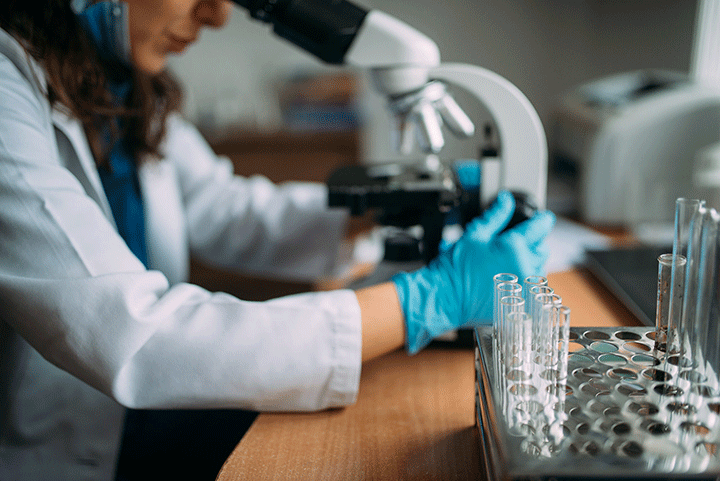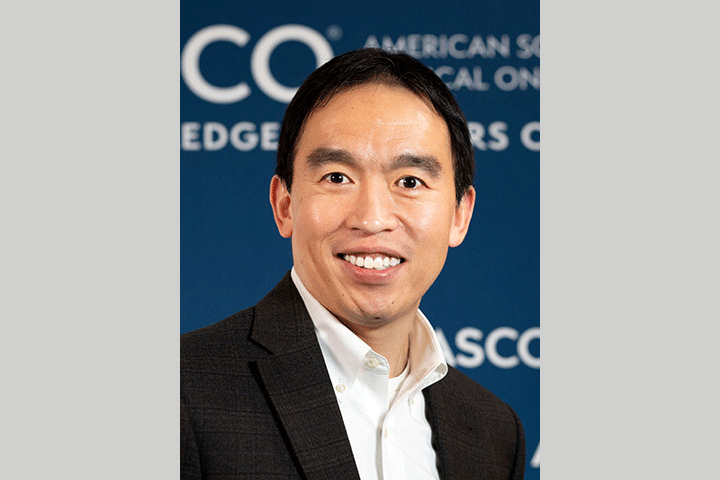Combination Delivers a Dual Punch to Pancreatic Cell Growth

Medical research is riddled with great ideas that show significant progress against a disease when used in a petri dish but fail miserably at a patient’s bedside.
Pancreatic cancer is no exception. Take, for example, research focused strictly on KRAS, a mutated gene that drives the abnormal cell division and growth of pancreatic cancer cells. Surprisingly, to date, trials targeting KRAS alone have shown little promise. Another avenue of research targets autophagy, or the cell’s recycling system. The term actually means “self-eating;” during the process certain parts of a cell are cannibalized by the cell to create energy. When that cell is cancerous, the process of autophagy allows the cell to continue to grow and divide uncontrollably. So far, cancer research targeting autophagy alone hasn’t shown much promise either.
But what if researchers combined two agents that targeted both the KRAS pathway and autophagy at the same time? That’s the premise behind a paper published in the journal Nature Medicine and the resulting clinical trial called THREAD, a phase I study that moved from the petri dish, to mouse models, to testing in humans in about 20 months. “Things have a tendency to move very slowly in medicine so this time frame was amazing,” says physician-scientist Conan Kinsey, M.D., Ph.D., a principal investigator of the THREAD trial and a Visiting Instructor and Medical Oncologist at the Huntsman Cancer Institute in Salt Lake City, Utah. “To say that I’m excited is kind of an understatement.”
Moving Quickly from Lab to Clinical Trial
The THREAD trial is the result of research work funded by the Pancreatic Cancer Collective, which is a partnership of the Lustgarten Foundation and Stand Up To Cancer. The Collective awarded $7 million in first-round “New Therapies Challenge” grants to seven teams of cancer researchers to explore new pancreatic cancer treatments. One of the seven grants, and the first to move from the lab setting to clinical trials, was a research project called Combined Targeting of MEK1/MEK2 and Autophagy for Pancreatic Cancer (MEK1/MEK2 are proteins activated by mutant KRAS). The effort was led by Martin McMahon, Ph.D., Huntsman Cancer Institute, and co-leader Eric Collisson, M.D., at the University of California San Francisco Helen Diller Family Comprehensive Cancer Center. The team tested the combined blockade of intracellular signaling via the RAS pathway, and autophagic recycling of the cells’ interior contents.
“The hope of all translational laboratory research is to get out of the lab, get to patients and then to help those patients,” says Kinsey, who was a co-investigator on the challenge grant trial. “This is a very early stage of clinical research, but it moved quickly out of the lab because we got a great response in a patient when we used the drug combination (under off-label treatment). And with pancreatic cancer a great response to new treatment regimens is desperately needed.”
That “great response” not only included longer-term survival, but also a dramatically improved quality of life for the patient. “This gentleman lived eight months longer than he was going to live with another treatment at this point, and with metastatic disease when you run out of options that’s a lot of time,” Kinsey says, adding the patient eventually developed drug resistance to the regimen, but that the team is looking at ways to overcome the all-too-common problem. “There were few side effects from this treatment, which was also incredible,” he says. “From all accounts, the patient felt great.”
The Huntsman-led research is bolstered by a separate study published in the same issue of Nature Medicine. This study outlines complementary findings regarding the effects of autophagy in pancreatic cancer in the laboratory setting and was led by Channing Der, Ph.D. and Kirsten Bryant, Ph.D., at the UNC Lineberger Comprehensive Cancer Center, Chapel Hill, North Carolina. McMahon and Der learned about the parallel nature of their research programs at a scientific meeting one year ago. Given the critical need for advances in pancreatic cancer therapies and the promise of their collective findings, they worked together to push their studies forward on a companion basis.
“It wasn’t a race to see who was going to be first to publish, rather it was a collaborative effort, which is always what makes science strong,” Kinsey says.
About the Trial
In the phase I THREAD trial, researchers will be looking at the safety and tolerability of increasing doses of a drug called hydroxychloroquine (HCQ) in combination with a fixed dose (stays the same) of another drug called trametinib in study participants diagnosed with metastatic or locally advanced, unresectable pancreatic ductal adenocarcinoma. The researchers want to determine the maximum tolerated dose and/or the recommended phase II dose of this combination.
HCQ is a drug commonly used in the treatment of malaria, lupus, and rheumatoid arthritis. It is currently in clinical trials, combined with chemotherapy, for the treatment of pancreatic and other cancers. Basically, HCQ stops or slows down the process of autophagy, a process that pancreatic cancer cells seem to be very dependent upon. That’s because the KRAS mutation, which is found in 85-95 percent of pancreatic tumors, appears to upregulate—increase the response to—the process of autophagy. “The way to think of it is that KRAS essentially makes a very hospitable environment for the autophagy process to work in pancreatic cancer cells,” explains Kinsey. “When that happens, those cells get more energy to grow and divide quickly, making the tumor very aggressive.”
Trametinib is a cancer treatment that specifically targets the MEK1 and MEK2 proteins within the cancer cell. MEK1 and MEK2 are part of a pathway called MAPK, which is directed by KRAS. “KRAS is a really tough protein to target so the thought is let’s go after the pathway proteins downstream that KRAS activates,” Kinsey explains. “If those proteins can be inhibited then the (signaling) pathway is disrupted.”
The duo-regimen is taken orally, meaning that study participants will not need to undergo intravenous chemotherapy infusions. “For patients, that’s generally viewed as very positive,” Kinsey says.
The phase I trial will recruit 20 patients to Huntsman. As the research moves forward, the goal is to recruit several hundred patients at sites including the University of California, San Francisco, and at Columbia University in New York.
“I don’t want to overstate anything because what works in one or two patients certainly doesn’t mean it’s going to work for everyone,” Kinsey says. “We need to evaluate this very carefully to see how well it works in many patients, and who benefits the most, which is why rigorous clinical trials are so very important in pancreas cancer.”
“But I’m hopeful. I’m a scientist and an oncologist who treats patients with pancreas and other gastrointestinal cancers. There’s been remarkable progress in treating colon cancer and maybe 20 years ago that wasn’t the case. But the way that happened was through a lot of basic science evolving into the clinical trial. The same thing needs to happen for pancreatic cancer.”
“It’s just a horrible disease that’s diagnosed too late so the majority of patients have advanced disease. These patients need and deserve more effective treatments.”
“The hardest thing to say to a patient with pancreatic cancer, or any cancer, is that we are out of options.”





